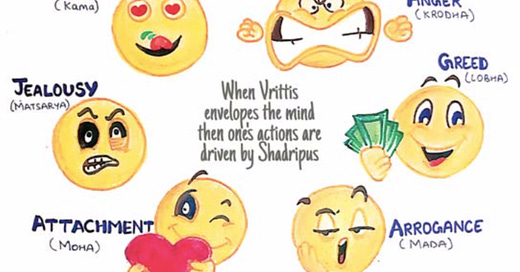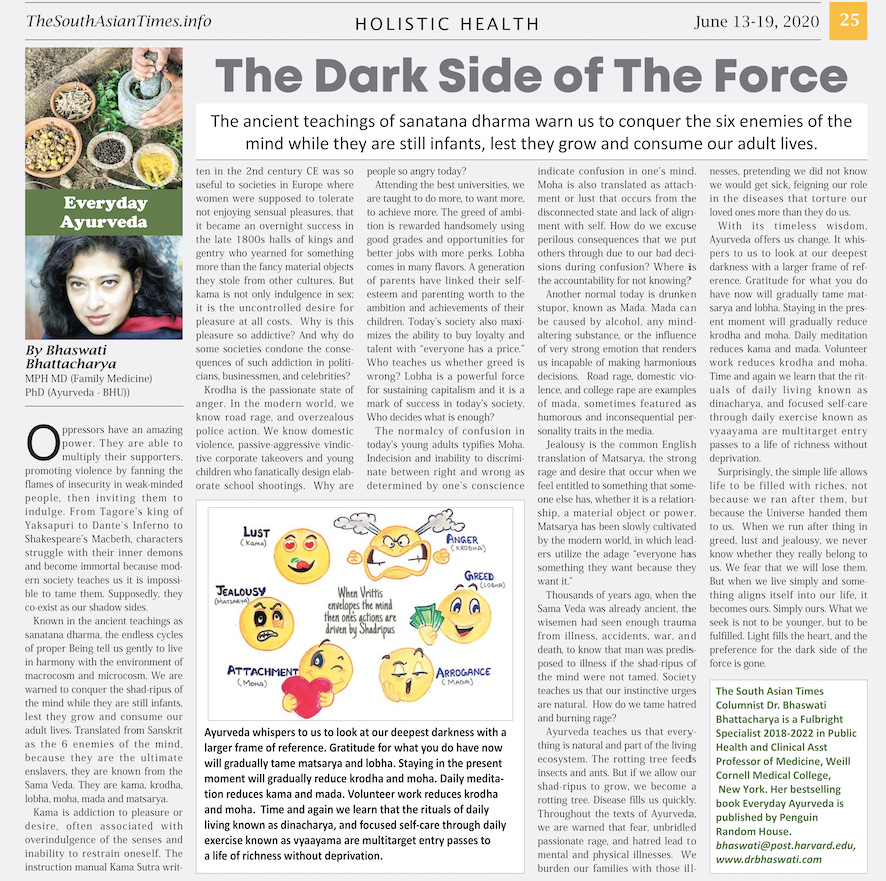The Dark Side of the Force
Understand the shad-ripus, the six enemies of the mind. These emotions indicate imbalance and not intuitive instinct.
Oppressors have an amazing power. They are able to multiply their supporters, promoting violence by fanning the flames of insecurity in weak-minded people, then inviting them to indulge. From Tagore’s king of Yaksapuri to Dante’s Inferno to Shakespeare’s Macbeth, characters struggle with their inner demons and become immortal because modern society teaches us it is impossible to tame them. Supposedly, they co-exist as our shadow sides.
Known in the ancient teachings as sanatana dharma, the endles cycles of proper Being tell us gently to live in harmony with the environment of macrocosm and microcosm. We are warned to conquer the shad-ripus of the mind while they are still infants, lest they grow and consume our adult lives. Translated from Sanskrt as the 6 enemies of the mind, because they are the ultimate enslavers, they are known from the Sama Veda.
They are kama, krodha, lobha, moha, mada and matsarya. Kama is addiction to pleasure or desire, often associated with overindulgence of the senses and inability to restrain oneself. The instruction manual Kama Sutra written in the 2nd century CE was so useful to societies in Europe where women were supposed to tolerate not enjoy sensual pleasures, that it became an overnight success in the late 1800s halls of kings and gentry who yearned for something more than the fancy material objects they stole from other cultures. But kama is not only indulgence in sex; it is the uncontrolled desire for pleasure at all costs. Why is this pleasure so addictive? And why do some societies condone the consequences of such addiction in politicians, businessmen, and celebrities?
Krodha is the passionate state of anger. In the modern world, we know road rage, and overzealous police action. We know domestic violence, passive-aggressive vindictive corporate takeovers and young children who fanatically design elaborate school shootings. Why are people so angry today?
Attending the best universities, we are taught to do more, to want more, to achieve more. The greed of ambition is rewarded handsomely using good grades and opportunities for better jobs with more perks. Lobha comes in many flavors. A generation of parents have linked their self-esteem and parenting worth to the ambition and achievements of their children. Today’s society also maximizes the ability to buy loyalty and talent with “everyone has a price.” Who teaches us whether greed is wrong? Lobha is a powerful force for sustaining capitalism and it is a mark of success in today’s society. Who decides what is enough?
The normalcy of confusion in today’s young adults typifies Moha. Indecision and inability to discriminate between right and wrong as determined by one’s conscience indicate confusion in one’s mind. Moha is also translated as attachment or lust that occurs from the disconnected state and lack of alignment with self. How do we excuse perilous consequences that we put others through due to our bad decisions during confusion? Where is the accountability for not knowing?
Another normal today is drunken stupor, known as mada. Mada can be caused by alcohol, any mind-altering substance, or the influence of very strong emotion that renders us incapable of making harmonious decisions. Road rage, domestic violence, and college rape are examples of mada, sometimes featured as humorous and inconsequential personality traits in the media.
Jealousy is the common English translation of matsarya, the strong rage and desire that occur when we feel entitled to something that someone else has, whether it is a relationship, a material object or power. Matsarya has been slowly cultivated by the modern world, in which leaders utilize the adage “everyone has something they want because they want it.”
Thousands of years ago, when the Sama Veda was already ancient, the wisemen had seen enough trauma from illness, accidents, war, and death, to know that man was predisposed to illness if the shad-ripus of the mind were not tamed. Society teaches us that our instinctive urges are natural. How do we tame hatred and burning rage?
Ayurveda teaches us that everything is natural and part of the living ecosystem. The rotting tree feeds insects and ants. But if we allow our shad-ripus to grow, we become a rotting tree. Disease fills us quickly. Throughout the texts of Ayurveda, we are warned that fear, unbridled passionate rage, and hatred lead to mental and physical illnesses. We burden our families with those illnesses, pretending we did not know we would get sick, feigning our role in the diseases that torture our loved ones more than they do us.
With its timeless wisdom, Ayurveda offers us change. It whispers to us to look at our deepest darkness with a larger frame of reference. Gratitude for what you do have now will gradually tame matsarya and lobha. Staying in the present moment will gradually reduce krodha and moha. Daily meditation reduces kama and mada. Volunteer work reduces krodha and moha. Time and again we learn that the rituals of daily living known as dinacharya, and focused self-care through daily exercise known as vyaayama are multitarget entry passes to a life of richness without deprivation.
Surprisingly, the simple life allows life to be filled with riches, not because we ran after them, but because the Universe handed them to us. When we run after thing in greed, lust and jealousy, we never know whether they really belong to us. We fear that we will lose them. But when we live simply and something aligns itself into our life, it becomes ours. Simply ours. What we seek is not to be younger, but to be fulfilled. Light fills the heart, and the preference for the dark side of the force is gone.
wk12. TheSouthAsianTimes
Obtain a pdf version of this column by clicking on the following image:
Dr. Bhaswati Bhattacharya is a Fulbright Specialist 2018‐2023 in Public Health. She serves as Clinical Asst Professor of Family Medicine in the Department of Medicine at Weill Cornell Medical College in New York, NY. Her bestselling book Everyday Ayurveda is published by Penguin Random House. To order an autographed copy, write to bhaswati@post.harvard.edu .





